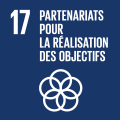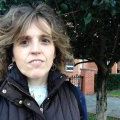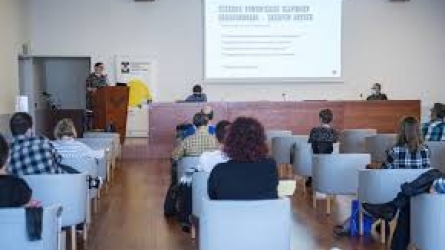
Health and Language IV: from research to knowledge
Description
This is the IV edition of the Summer Course on Health and Languages. The subject of language and healing is so complex and broad that it would require in-depth analysis. It can be said that any language planning in the health field should meet three requirements:
1- Situation based on evidence.
2- The focus on people.
3- take into account the local administrative situation, the institutional organization and the social environment.
In this edition the main objective of the course will be research. The research process is proposed here as an option in a broad sense. In this course, the lines of research that can be prioritized in the health field will be identified and information on ongoing projects will be provided. On the other hand, the possibilities of expanding the research and the knowledge derived from it will be exposed. In addition, the possibilities and experiences of incorporating the results of the different investigations into continuous training in language and health will be analyzed. Finally, sharing and disseminating the knowledge generated through research and implementation processes will be approached as an appropriate tool to promote quality and equitable care in the social and health field.
Objectives
Establish the mandatory nature of research on language management in healthcare activities: identify research opportunities and promote ongoing research.
Promote that social health care personnel, using knowledge based on research and evidence, develop activities appropriate to linguistic diversity in their professional career.
To be a meeting point between professionals and multidisciplinary institutions of different origins, promoting debate and above all collaboration.
To be a starting point for the becoming of the UPV/EHU as a leadership and international reference in language and health.
Disseminate the research projects of the students of the postgraduate own expert title organized by the UPV / EHU in collaboration with the UEU.
Activity directed to
- University students
- Students not from university
- Teachers
- Professionals
- Osasun sistemako erakunde eta enpresetan ardura postuak dituzten pertsonak
Program
15-07-2021
Erregistroa
Presentation by the Director of the activity
- Aitor Montes Lasarte Osakidetza - Ikastaroaren zuzendaria
- Jon Zarate Sesma UPV/EHU - Ikastaroaren zuzendaria
“Language and quality of care through qualitative research “
- Danielle de Moissac Université de Saint-Boniface - Full professor (This speaker will speak Via Zoom)
“The subject of language and long life learning at the university “
- Jacinthe Savard University of Otawa - Ikertzailea (This speaker will speak Via Zoom)
Break
“Euskara plana: ikerketatik ezagutzara“
- Aitor Montes Lasarte Osakidetza - Ikastaroaren zuzendaria
Round table: “Ikerketatik eratorria den ezagutza zabaltzeko euskaraz argitartzeko dauden aukerak“
- Izaskun Elezgarai Gabantxo UPV/EHU - Irakasle-ikertzailea (Moderator)
- Leire Escajedo San-Epifanio UPV/EHU - Irakasle-ikertzailea eta UPV/EHUko Argitalpen Zerbitzuko zuzendaria
- Nekane Balluerka Lasa UPV/EHU - Irakaslea eta Qualiker Ikerketa Taldeko burua
- Aitziber Agirre Ruiz de Arkaute Elhuyar aldizkariko zuzendaria
Synthesis
16-07-2021
“`Hizkuntzen Kudeaketa: Euskara Komunikazio Klinikoan´ UPV/EHUren (UEUrekin elkarlanean) graduondokoaren bigarren edizioaren aurkezpena eta ebaluaketa“
- Jon Zarate Sesma UPV/EHU - Aditu tituluaren zuzendaria
“Emakume mediku, eta gainera, euskalduna? Zama hirukoitza“
- Saioa Martinez de Lahidalga Azkue UPV/EHU - Medikuntzan graduatua eta graduondoko Aditu Titulatua
Graduondoko ikasleen ikerketa proiektuen aurkezpenak
Break
Graduondoko ikasleen ikerketa proiektuen aurkezpenak
Closing session
- Aitor Montes Lasarte Osakidetza - Ikastaroaren zuzendaria
- Jon Zarate Sesma UPV/EHU - Ikastaroaren zuzendaria
Directors
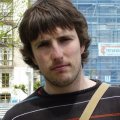
Jon Zarate Sesma
OSAKIDETZA
Jon Zarate Sesma (Lekeitio, 1979) UPV/EHUko Farmazia eta Elikagaien Zientziak Saileko kide da. Farmazia Fakultateko irakaslea da eta Euskararen eta Etengabeko Prestakuntzaren arloko errektoreordea. Farmazian doktorea da (UPV/EHU, 2007) eta 2016ko osasun-arloko Koldo Mitxelena euskarazko tesi onenaren zuzendaria izan da. Azken urteetan gene terapiarako garraiatzaile ez-biralen garapenean ikertzen aritu da. Goi mailako nazioarteko ikerketa aldizkarietan 20 artikulutik gora dauzka argitaratuta eta euskarazko produkzioa zientifikoa ere nazioartekoaren parekoa dauka Ekaia edo Elhuyar bezalako aldizkarietan.
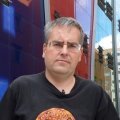
Aitor Montes Lasarte
Osakidetza
Basaurin jaioa (1972), Euskal Herrian. Medikuntzan lizentziaduna UPV/EHUn, 1999an. Familia medikuntzako espezialitatea burutu zuen 2004an, Galdakao-Usansoloko ospitalean (Euskal Herria). Gaur egun familia medikua da Aramaion, Debagoiena Erakunde Sanitario Integratuan (ESI), Osakidetza-Euskal osasun zerbitzuan. OEEko (Osasungoa Euskalduntzeko Erakundea) kidea. Euskal prentsan iritzi artikuluak idazten ditu noizean behin. Hizkuntza eta osasungintzarekin zerikusia duten hamar bat argitaratu ditu aldizkari zientifikoetan, batik bat Osagaiz, BAT soziolinguistika aldizkarian eta International Journal of Integrated Care aldizkarian. Eskalatzailea, zenbait bide berri zabaldu eta argitaratu ditu prentsa espezializatuan.
Speakers

Aitziber Agirre Ruiz de Arkaute
Elhuyar
Aitziber Agirre Ruiz de Arkaute (Gasteiz, 1974) She works at the Elhuyar Foundation in the field of science journalism. She is currently the director and editor of Elhuyar magazine, and previously served as the presenter and editor of the TV show Teknopolis. She has a PhD in Biochemistry. She did her PhD in the Biophysics Unit (CSIC-EHU), researching the mechanisms developed by polio, HIV and influenza viruses to infect cells.
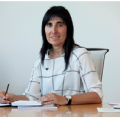
Nekane Balluerka Lasa
Graduate (1989) and doctor (1993) in Psychology from the UPV/EHU, both times with Extraordinary Prize, where she has been a professor since 1989. Vice-Dean of the Faculty of Psychology (2004-2006), Vice-Rector for Teaching Quality and Innovation ( 2006-2009) and Postgraduate Studies and International Relations (2012-2016), member of the University Commission for Teaching Evaluation (2007-2012), and member (209-2012) and president (2012-2013) of the Ethics Committee for Research and Teaching Practice with human beings of the UPV/EHU. Rector of the UPV/EHU (2017-2021). He directs the Qualiker research group (group A of the Basque university system). Visiting researcher at three foreign universities. He has participated in 51 research projects (in 14 as IP). Co-author of 124 scientific articles, 28 books and 10 book chapters and nearly 60 invited conferences and 200 contributions at national and international conferences. His lines of research focus on the methodology for the preparation and intercultural adaptation of psychological evaluation instruments, on multilevel analysis models and on the design, implementation and evaluation of programs to promote socio-emotional competencies.

Danielle de Moissac
Danielle de Moissac Ph.D. (Physiologie, University of Manitoba) Professeure titulaire. Co-directrice du Groupe de recherche et d'intervention sur le bien-être en milieux éducatifs (GRIBEME). Membre du Groupe de recherche sur la formation professionnelle en santé et service social en contexte francophone minoritaire (GREFOPSS). Membre du Groupe de recherche interdisciplinaire sur les pratiques d'offre active de services en français (GRIPOAS).
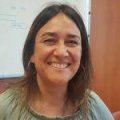
Izaskun Elezgarai Gabantxo
EHU
Biologian lizentziatua da (1997) eta Zientzietan Doktorea (Neurozientziak 2002; Doktoregoko Sari Berezia) Euskal Herriko Unibertsitatean. Kontratu posdoktoralak izan zituen Magendie Neurozentruan Bordelen (2003-2005). 26 ikerkuntza-proiektutan hartu du parte, 32 nazioarteko artikuluren egile da. Osagaiz osasun-zientzia aldizkariko erredakzio batzordekidea da. 3 Doktorego Tesi, 5 Master Amaierako Lan eta Gradu Amaierako Lan bat zuzendu ditu. Ikerkuntza-lerroak: Endokannabinoide Sistema osasunean eta gaixotasunean, animalia ereduetan (alkohola, epilepsia). Graduko irakaskuntza (Medikuntza): Giza Anatomia I-IV, Ikerkuntza biomedikora sarrera, Ikerkuntza proiektua. Masterreko Irakaskuntza: Neurozientziak Unibertsitate Masterra.
Leire Escajedo is Professor of Public Law, and Law and Ethics in the Biosciences at the UPV / EHU and Director of the Academic press. Bachelor and Doctor of Laws (2004) and PhD in Biological Sciences (2015), she was trained in the Interuniversity Chair of Law and Human Genome and in the Department of Constitutional Law of the UPV / EHU, and since 2010 she coordinates the area of Law and Ethics in Biosciences at the Faculty of Science and Technology. She is principal investigator for the Urban Elika group and a member of the Multilevel Gobernance research group. Among others, she has published several articles in Basque on ethical and legal aspects of scientific and technological advances. Highlights, on the one hand, a work on Human cloning, CAF Elhuyar award, and, on the other, a research monograph on the advances of Biotechnology, awarded by the International Society of Bioethics (SIBI) and published in Spanish, English and Basque.
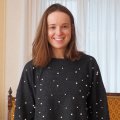
Saioa Martinez de Lahidalga Azkue
Medikuntzan graduatua (EHU, 2019). Emakumeen fisiologian ardazturiko Gradu Amaierako Lana egin zuen, Begoña Sanz eta Iñaki Arratibelen gidaritzapean: “Hileroko zikloaren eragina emakume arraunlarien errendimenduan: hilerokoaren hautematea bi emakume taldetan eta arraunlarien errendimenduan duen eragin subjektibo eta objektiboa aztergai”. EHU eta UEUk elkarlanean abiatutako “Hizkuntzen kudeaketa osasun arretan, euskara komunikazio klinikoan” Graduondokoaren lehen edizioko ikaslea izan zen (UEU eta EHU, 2020). Graduondoko amaierako lan gisara, Urola Kostako adinekoen osasun arretan hizkuntzak duen eragina aztertu zuen, Felix Zubia medikuarekin batera. Osasungintza eta kirola uztartzen dituzten hainbat ikastaro egin ditu, hala nola, FEMEDE elkartearen “Ayudas ergogénicas” eta José López Chicharrok zuzendutako “Ciclo menstrual y rendimiento”.

Jacinthe Savard
Jacinthe Savard détient un baccalauréat en ergothérapie de l’Université Laval, une maîtrise en administration des services de santé et un doctorat en santé publique de l'Université de Montréal. De 1983 à 1996, elle a travaillé dans le réseau de la santé au Québec, occupant des postes combinant des responsabilités cliniques et de gestion. Arrivée à l'Université d'Ottawa en 1996, comme professeure remplaçante, elle est maintenant professeure agrégée au programme d’ergothérapie de l’École des sciences de la réadaptation, où elle enseigne le cours L’intervention ergothérapique auprès des adultes (santé physique) et le cours Pratique factuelle en réadaptation. En 2011, elle s’est jointe au GReFoPS (Groupe de recherche sur la formation et les pratiques en santé et service social en contexte francophone minoritaire) nouvellement formé.
Registration fees
| Face-to-face | Until 15-07-2021 |
|---|---|
| 77,00 EUR | |
| 65,00 EUR | |
| 54,00 EUR | |
| 65,00 EUR | |
| 65,00 EUR | |
| 65,00 EUR | |
| 19,25 EUR | |
| 0 EUR | |
| 0 EUR |
Venue
Bizkaia Aretoa-UPV/EHU
Avenida Abandoibarra, 3. 48009- Bilbao
Bizkaia
Bizkaia Aretoa-UPV/EHU
Avenida Abandoibarra, 3. 48009- Bilbao
Bizkaia
Sustainable development goals
Agenda 2030 is the new international development agenda approved in September 2015 by the United Nations. This agenda aims to be an instrument to favour sustainable human development all over the planet, and its main pillars are the eradication of poverty, a reduction in equality and vulnerability and fostering sustainability. It is a unique opportunity to transform the world up to 2030 and guarantee human rights for all.

3 - Good health and well-being
Guarantee a healthy life and foster the well-being of all people of all ages. Key issues: universal healthcare coverage, sexual and reproductive health, reduction in the number of road accident casualties, pollution and chemical products, reduction in maternal and neonatal mortality, the end of epidemics such as AIDS, combating hepatitis and other water-borne diseases, drug and alcohol prevention, control of tobacco.
More information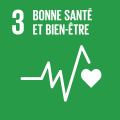
5 - Gender equality
Achieve gender equality and empower all women and young girls. Key issues: the end of all forms of discrimination and violence, recognition of unpaid care and domestic work, shared responsibility, equal opportunities, full and effective participation in reproductive rights, equal rights vis-à-vis economic resources, access to land and other assets and ownership.
More information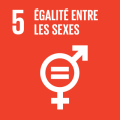
10 - Reduced inequalities
Reduce inequality in countries and between them. Key issues: promotion of the social, economic and political inclusion of all people, equal opportunities, fiscal, wage and social protection policies to favour equality, migration and the policies that affect it, official assistance for the development, regulation and supervision of world institutions and markets.
More information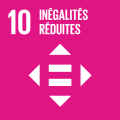
17 - Partnerships for the goals
Strengthen the means of implementation and revitalise the World Alliance for Sustainable Development. Key issues: mobilisation of resources, 0.7% of GDP for official overseas development aid, finances, cooperation in technology and innovation, ecologically rational technologies, skills building, universal and multilateral trade system, coherence on the legislative and institutional levels, availability of data, supervision, indicators and accountability.
More information